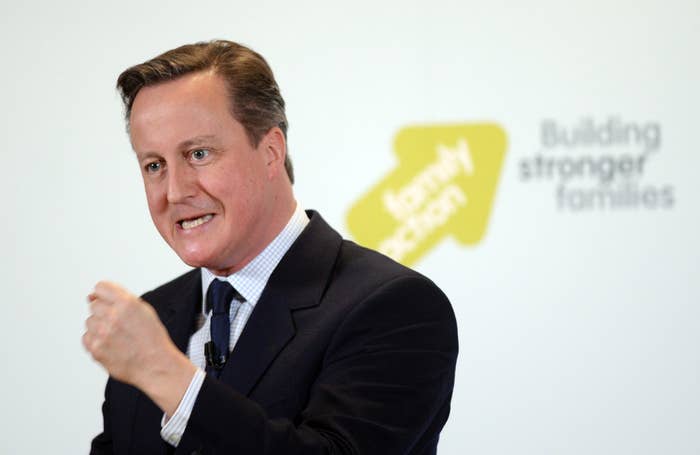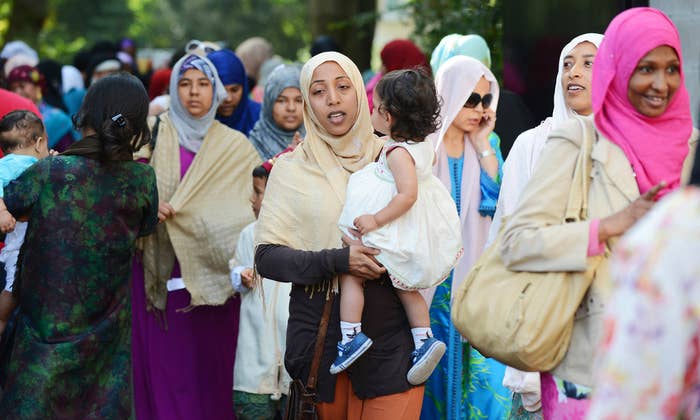David Cameron has been criticised for saying migrant women who can't speak English risk being deported, despite his government having twice cut funding for language courses.

On Monday, the prime minister announced a new £20 million programme to help Muslim migrant women improve their English and boost integration. Those who failed to improve after two and a half years could not be guaranteed a place in the UK, he said.
The plan applies to women who come to the UK on spousal visas.
But Cameron was sharply criticised after announcing the scheme, which comes into effect later this year.
Jonathan Portes, a principal research fellow at the National Institute of Economic and Social Research, said the announcement "would be less obviously hypocritical if the government had not cut funding for English language courses".
Catherine Sezen, a senior policy manager at the Association of Colleges, told BuzzFeed News the funding would not make up for five years of cuts. "We estimate that there were 2,000 fewer women undertaking ESOL [English for speakers of other languages] courses in the last academic year (2014/15) as opposed to 2012/13," she said.
This is now the third time the prime minister has called on immigrants to learn English despite the government previously cutting funding needed to deliver the lessons.
The government first cut funding for ESOL classes in 2011, which forced an estimated 100,000 (of 190,000 learners) to drop the classes because of the increased cost.
Again, in July 2015, the government announced it would cut £45 million of funding for English classes for jobseekers.
It came a year after then culture secretary Sajid Javid said immigrants coming to the UK should learn English to become British.
The funding had been allocated to a compulsory programme for those seeking Jobseeker's Allowance in a bid to help claimants better integrate into the UK and make it easier for them to find a job.
This affected some 16,000 learners, according to the Association of Colleges. The removal of funding for the classes took place on the same day the government launched a review into how best to tackle isolation in British communities.
Speaking on BBC Radio 4's Today programme, the prime minister was forced to admit his government had cut funding for English language classes on two previous occasions.

However, Cameron defended the cuts and said the government "had to make difficult decisions". He insisted the difference now was that the £20 million in funding would be better targeted. "It will go after the particular problem area," he said.
The prime minister also said the classes were not necessarily just for Muslim women, but women of all faith groups.
The 2011 census revealed that 2% of the population in England and Wales did not speak English. It also made clear that some areas were particularly badly hit, with 8-9% of the local population unable to speak English well.
While Muslim organisations welcomed the plan to extend English teaching, they expressed concerns it was being touted as a way to prevent radical extremism.
"Additional funding to learn English is good for Muslim women and vulnerable women generally – but it shouldn't be linked to the prevention of extremism," warned Faeez Vaid, executive director of the Muslim Women's Network UK.
Vaid told BuzzFeed News that the plans should be seen as a "long-term strategy", adding that the government needed to put more resources behind "short-term causes that can alienate Muslim women".
"Most Muslim women in the UK already speak English well, but are still marginalised [due to reasons] including institutionalised patriarchy, racism, and Islamophobia," she said. "So while these women may go and learn English, they should also have services that can help them communicate in their mother tongues, and have access to resources to help them with the immediate problems they may face."
The Muslim Council of Britain (MCB) also questioned the prime minister's claims that around 1 in 5 Muslim women were unable to speak English.
It cited a report it published last year that suggested the actual proportion of Muslims unable to speak English proficiently was around 6%.
"The statistic that the prime minister has used is not, in any absolute way, the only or most statistically significant on," said Dr Shuja Shafi, secretary general of the MCB. "Other studies, including our report, give a lower percentage for the number of Muslims struggling with the English language. We need to study the other data available on English language in relation to Muslims."
He added: "English language is a barrier, but not the only or most important one. Other factors such as labour market inequalities, perceived discrimination, deprivation, and generational differences amongst Muslim women need to be reflected on."

